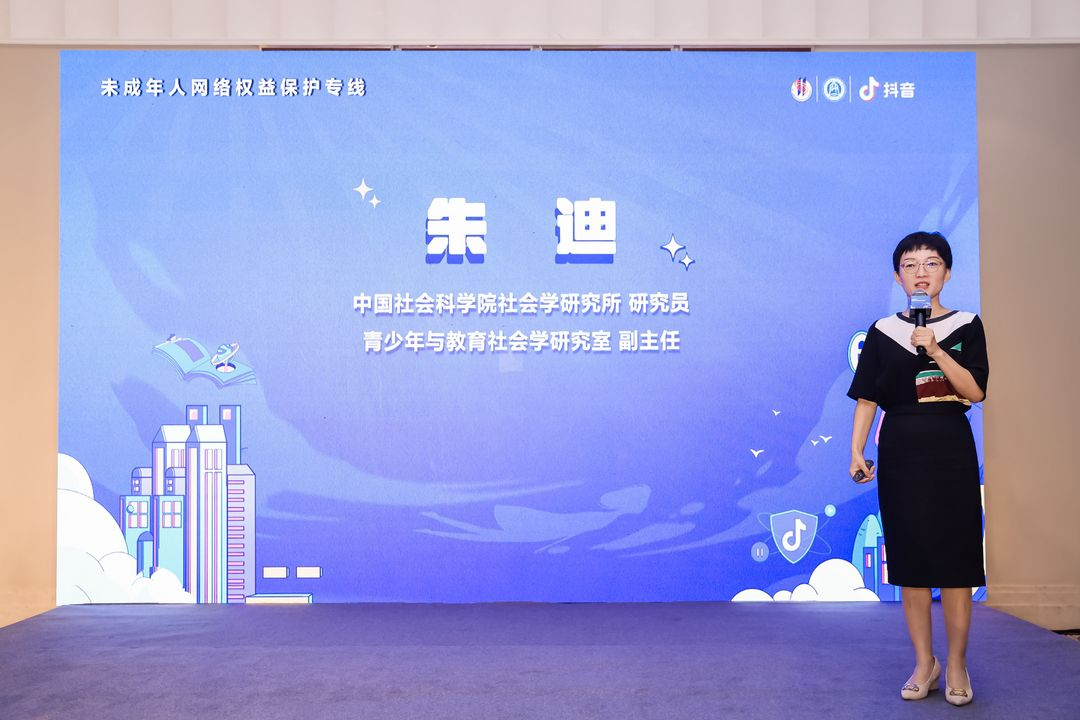On September 26, Douyin held a seminar on "Comprehensive Development - Protection of Minors' Online Rights and Interests" in Chengdu, Sichuan Province. It is reported that this seminar is the third session of the national tour of the Douyin Special Action for the Protection of Minors "Special Line for the Protection of Minors' Online Rights and Interests" (hereinafter referred to as the "Special Line"). At the seminar, participating experts and the media discussed ensuring the safety of minors' use of the Internet and improving their online literacy.

The picture shows Zhu Di, a researcher at the Institute of Sociology of the Chinese Academy of Social Sciences
Zhu Di, a researcher at the Institute of Sociology of the Chinese Academy of Social Sciences and deputy director of the Research Office of Sociology of Youth and Education, delivered a speech on the theme of "From Consumer Protection to Consumption Empowerment". Judy points out that using the research framework of consumer education to understand the relationship between teenagers and short videos should focus on two meanings. First of all, the use of platform services by teenagers is itself a typical consumer behavior. In addition, short videos are very special for teenagers, it has a lot of information, is an easy-to-read, information-intensive platform service, can give teenagers a lot of knowledge information, lifestyle values of the impact, so it is an important channel for adolescents to consumer education.
Judy believes that the significance of consumer education is to allow individuals to acquire knowledge skills and cognition, so that they can make full use of the consumption opportunities provided by the current complex market, to face the market, global challenges, to be able to act actively in the market, but also to benefit the business environment is more perfect, so that consumers are aware of the social and environmental consequences of consumption choices. Consumer education focuses more on making consumers a responsible consumer in the Western context, but in the context of contemporary Chinese society, more emphasis is placed on changing the concept of consumption, which can neither be particularly frugal nor extravagant and wasteful. This is a very good theoretical framework for youth education in the digital age and can help teenagers establish an active and healthy lifestyle. "First of all, from the perspective of consumption, the theoretical framework of consumer education involves advertising, marketing, consumer rights and responsibilities, sustainable consumption, etc. Second, from the individual and family level, consumer education includes financial management, household consumption management, children's consumption education and network literacy. In fact, the important content of consumer education is to cultivate the comprehensive literacy of primary consumers, who are also vulnerable groups in consumption, including teenagers and the elderly. At the producer level, consumer education emphasizes consumer protection and corporate social responsibility. ”
Judy summed up the four characteristics of contemporary youth culture and consumer culture, "The first is everydayness, and now online shopping and online entertainment have been integrated into the daily life of teenagers; the second is sociality, in the interaction of teenagers, the topics discussed by peer groups, and even peer pressure, a lot of them come from the sharing of Internet information and the use of the Internet." The third is class, which is a typical sociological discourse. Adolescent culture is largely a reflection of the economic and social status of parents. The fourth is vulnerability. Compared with adults, adolescents have a certain vulnerability in culture, behavior, and lifestyle. ”
Judy proposed that at the protection level, improving the network security knowledge of teenagers is to help teenagers establish a positive and healthy lifestyle, prevent unhealthy Internet habits, and let teenagers establish a lifestyle in harmony with the Internet. At the empowerment level, improving the information ability of adolescents is to enhance the ability of adolescents to obtain, use and analyze information through Internet media such as short videos. "It is hoped that all parties, including platforms, academia, the media, as well as families and adolescents themselves, can commit themselves to the education of adolescents in the digital age and strengthen the protection and empowerment of adolescents."
It is reported that in order to effectively protect the online rights and interests of minors, on April 14, Douyin, together with academic institutions and media, launched a "special line" special action. Up to now, 5 academic institutions and 27 media have joined the "special line".
<b>[If you have a news thread, please report to us, once adopted, there is a fee reward.] WeChat attention: ihxdsb, QQ: 3386405712].</b>